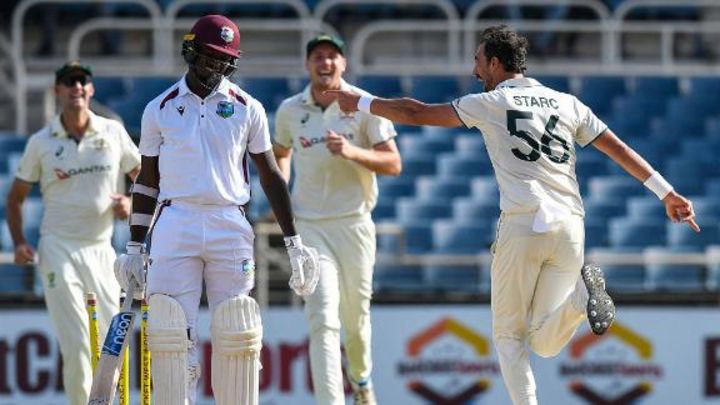After 27 all out, West Indies come face to face with deepening Test crisis
Sabina Park collapse symbolises West Indies' Test malaise, but what is the way ahead?
West Indies fold for second-lowest Test total
Australia's bowling attack routed West Indies on Day 3, as Mitchell Starc took 6 for 9There's never a good time to be bowled out for 27. Monday at Sabina Park felt like a particularly bad one for West Indies.
At 11 for 6, New Zealand's 70-year record of 26 all out was under threat. When Scott Boland took his hat-trick, there was a realistic chance they would at least have someone to share it with. There won't be many people across the Tasman shouting Sam Konstas a beer after his misfield.
Less than 24 hours later, Cricket West Indies has called an emergency summit with invites to a host of former greats for help. But there will be skepticism about whether it will make any difference.
As impressive as Mitchell Starc and Boland were, it was a woeful display. They couldn't even say it happened in the night session. There had been warning signs in the first two Tests when their second innings fell apart rapidly; their last performance of the series was the sum of all fears. Within six balls, there was the sense it could be a horror show.
John Campbell can be excused somewhat as he edged a perfect outswinger from Starc. He had shown some gumption in earlier innings. You also need to have some sympathy for debutant Kevlon Anderson padding up to an inswinger and then reviewing, a clear sign of a frazzled mind. Brandon King, who had performed encouragingly, decided a booming drive was the best option despite having seen Starc curving the ball late.
King made West Indies' one half-century of the series - his 75 was also the highest individual score on either side - but no one else, barring Anderson Phillip who played a single match, averaged over 20. Batting was tough, for sure, and Australia weren't immune from their own problems, but there were numerous techniques exposed. No doubt the game in West Indies needs help, but it also needs to help itself.
Since February 2023, when Kraigg Brathwaite and Tagenarine Chanderpaul each score hundreds in a 336-run stand against Zimbabwe, West Indies have had two centuries: Kavem Hodge against England and Justin Greaves against Bangladesh. There have been some fallow periods in West Indies' batting over the last 25 years - they started the 21st century by making totals of 54, 61 and 82 in 2000 - but this might be the lowest point, and not just statistically.
This performance also comes at a time when the future structure of Test cricket is at the forefront of debates. Nothing is yet decided, although some plans may be outlined at the ICC's annual conference in Singapore this week, and while it can be easy to be drawn into sweeping statements after events such as Sabina Park, the problems facing West Indies in the format are as acute as any of the Full Members.
They have managed a couple of landmark victories in recent times - defeating Australia at the Gabba and Pakistan in Multan - but they look like outliers. The win in Brisbane persuaded administrators to add a third Test to this series, which became the Sabina Park day-nighter.
That they competed with Australia for the first two days of each Test is worthy of note, but that was largely down to the fast bowlers. Jayden Seales, Shamar Joseph and latterly Alzarri Joseph performed superbly, supported by Greaves' brisk medium pace, and made life very uncomfortable for the visitors. They are carrying the team but are being asked to perform miracles.
It needs to be questioned whether a factor they are taking advantage of - the pitches - has veered too far one way; although, with something of a grimace, Roston Chase said the Jamaica pitch was the best of all three.
It's all well and good playing to your strengths, the bowlers making the most of a ball zipping around, but when your weakness is so weak it makes everything futile. Since the start of 2023, the West Indies, as a venue for Tests, has the lowest collective batting average where more than a single match has been played. West Indies, themselves, average just 18.39 in that period, by far the lowest for a home side.
Clearly, the problems in West Indies run deeper than the 22 yards but after the second Test in Grenada, coach Daren Sammy spoke about the surfaces around the Caribbean and how batters even at domestic level are unable to trust their games. Slightly counter to that, Chase said it was hard to judge players properly as each team had a couple of good bowlers.
West Indies have away tours of India and New Zealand next where the batters are likely to be severely challenged again. Their other away series in this WTC cycle is in Bangladesh. Back at home they will face Sri Lanka and Pakistan, teams they may believe they can compete with.
After the match had raced to its hasty conclusion and the presentations were completed, Starc delayed his return to the Australian celebrations to chat with uncapped West Indies quick Johann Layne who is highly regarded as part of the next generation. Layne appeared to be lapping up all the tips from one of the game's greats. It can only be hoped that he has a viable Test team to be part of, and a chance to face Australia in the future.
Andrew McGlashan is a deputy editor at ESPNcricinfo
Read in App
Elevate your reading experience on ESPNcricinfo App.
